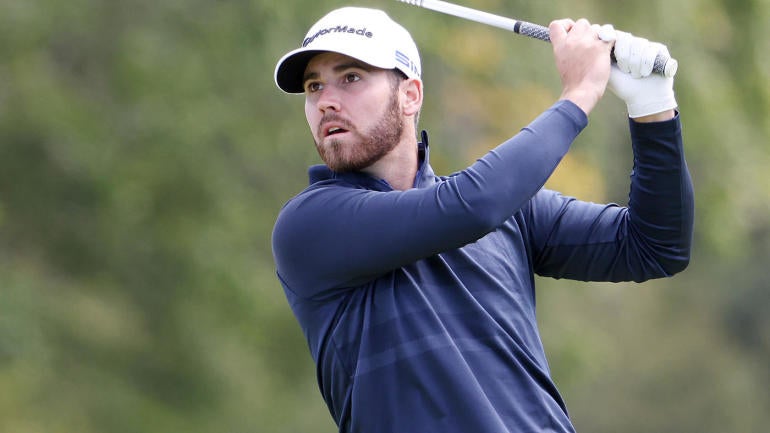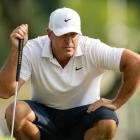
Monday morning after a major championship is always an interesting time for golf and golf fans. There is a vapid nature to these days that no more major golf exists for seven weeks, but also tons to discuss regarding what just unfolded. Before we look ahead to the Masters in November, I wanted to look back at the 2020 U.S. Open at Winged Foot and break down a few things that happened at the 120th edition of this tournament.
The big story, of course, was Bryson DeChambeau's massive win and what it means for the future of the sport, but that does a disservice to how many other interesting storylines unfolded throughout the week.
Here are five I woke up thinking about Monday morning.
1. Matthew Wolff parallels: At the 2014 Masters, a 20-year-old Jordan Spieth led Bubba Watson by two with 11 holes to play. He lost by three. At the 2020 U.S. Open, a 21-year-old Matthew Wolff led Bryson DeChambeau by one with 15 holes to play. He lost by six. The key here for Wolff is that he did not fall apart, nor did he wilt under the pressure. He simply got vaporized by one of the great final rounds in major championship history.
The other key aspect is that Wolff has now felt the heat on two different major Sundays. He finished T4 at the PGA Championship and now solo second at Winged Foot. You cannot replicate that type of environment -- fans or not -- and as long as the scars don't cut too deep (this one won't, given its nature), it will almost certainly help him in future majors because now he has expectations for how his body will feel if he's in it again on a Sunday. Spieth won two of his next five majors after that loss to Watson.
"I played really tough all week," said Wolff. "I battled hard. Things just didn't go my way. But [for my] first U.S. Open, second place is something to be proud of and hold your head up high for. I'm just excited to learn from this experience, and it's definitely not the last time that I'm going to be in this spot."
2. Bryson's short game: We hooted and hollered on Sunday evening about the driver, but can we talk about how good your short game has to be to make just 11 bogeys on a week in which you barely hit 40% of fairways? For example, the shot DeChambeau hit on No. 4 out of the rough that led to birdie has nothing to do with his length off the tee or swinging the driver like Manny Ramirez used to swing it at Fenway Park.
So while the distance should (and will) lead to all sorts of debates and discussion, let's not lose sight that you cannot win a U.S. Open without elite wedge play and putting from 125 yards and in. That gets drowned by DeChambeau's weightlifting routine, but without it, we're talking about a 21-year-old making a different kind of history on Sunday.
3. Who is Will Zalatoris? If you're scanning the top 10 on Monday morning, he's certainly the name that sticks out. So who in the world is Will Zalatoris, the guy who finished T6 alongside Dustin Johnson at 5 over for the week? The former ACC Player of the Year at Wake Forest and highly-successful amateur is absolutely torching the Korn Ferry Tour in 2020. He has 10 top 10s (including a win) on that tour and is up into the top 80 in the Official World Golf Rankings with his top-10 finish at Winged Foot.
We likely won't see him on the PGA Tour until late 2021 because COVID-19 restrictions have prohibited Korn Ferry players from graduating to the big leagues, but when we do, it's likely that he's going to follow in the footsteps of Scottie Scheffler and Sungjae Im and transition from Korn Ferry star to PGA Tour Rookie of the Year. Data Golf has him ranked as the 24th-best player in the world, just ahead of Tommy Fleetwood and just behind Tiger Woods.
Want the sharpest DFS advice, picks and data-driven golf analysis? Listen below and subscribe to The First Cut Golf podcast where we explain what's happening on the course so you can win off of it.
4. D.J. top 10: Did you watch any of Johnson's tournament all weekend and -- at any point -- think, "Man, he's definitely going to top 10 this week"? I'm guessing no. And yet, he finished T6, never shot worse than 73 and notched his 19th top 10 at a major (and sixth at a U.S. Open). This speaks to a lot of different things, not the least of which is that even when it feels like D.J. is only playing average, his game is still among the best in the world. Also, to drive home just how outrageously good DeChambeau played: D.J. gained 11.3 strokes on the field, DeChambeau gained 22.3.
5. USGA got it right: The setup and the tournament were absolutely perfect. The USGA gets lit up a lot (and rightfully so in various situations), but it nailed the entire week. Even Round 1, which played easier than most folks thought, served the purpose of letting players attack and slowly reeling them back to level par by Sunday evening. It worked in every instance except for one (DeChambeau). Here's how many players were under par after each round (in order): 21, 6, 3, 1.
There will always be nits to pick with any of this stuff -- I wouldn't have minded firmer greens on Saturday afternoon -- but on the whole, they created an opening five-hole gauntlet that destroyed the leaders on Sunday and a course that separated the best ball-strikers for the week from everyone else. Their hands are tied in some situations by the length of players in 2020 -- ironically, their hands are tied by themselves, given that they are also in charge of equipment and rules -- but they put on a fair test at a great course that rewarded the best players and resulted in an unbelievable board. It's hard to ask for more than that.





















